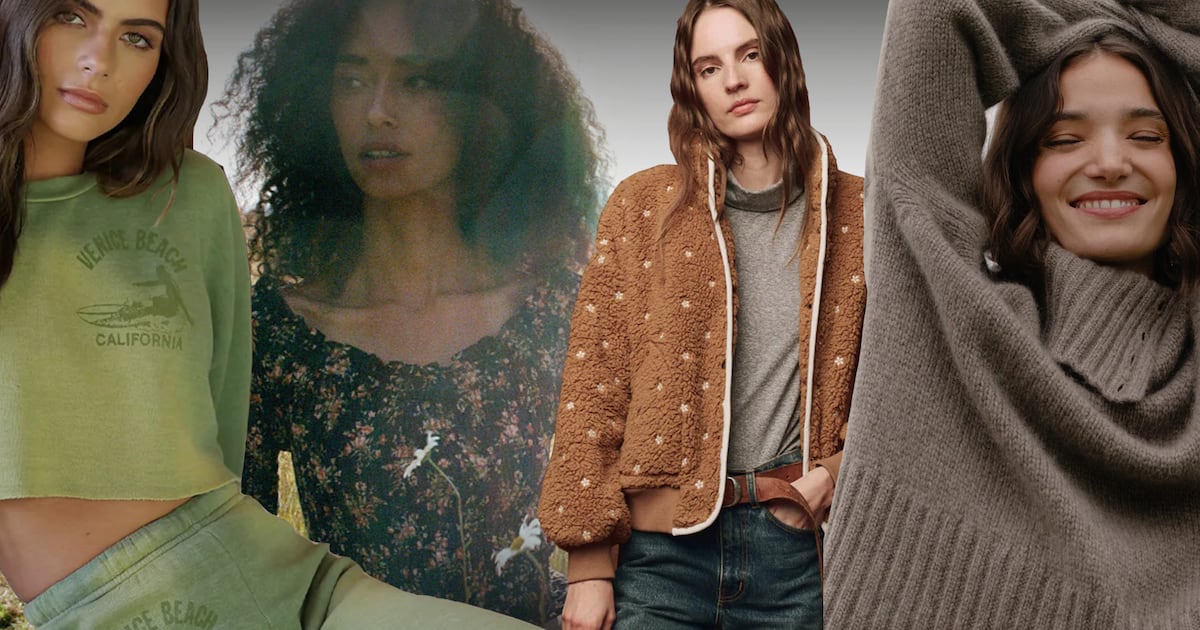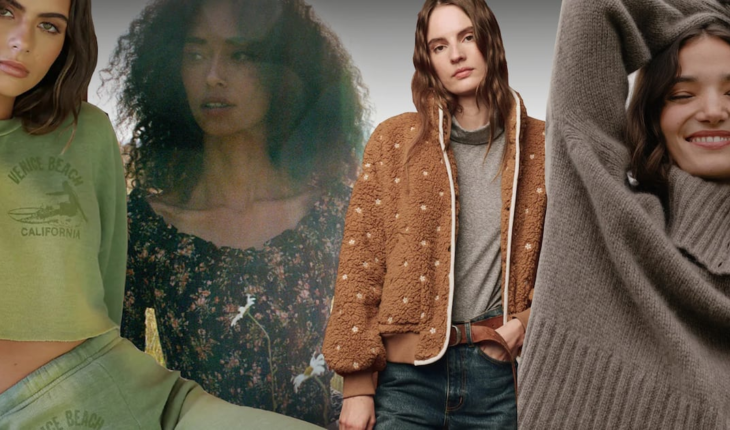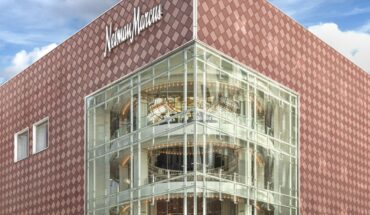
LOS ANGELES — Move over, Scandi minimalism and French girl chic — effortless Californian cool is making a bid to be the next regional style aesthetic with global potential.
A wave of Golden State brands are selling Americans on an updated version of California style that’s both low-lift and luxurious, simple but still detail-oriented. Each of these brands offers their own unique take on the look: Jenni Kayne is known for its relaxed sweaters and trousers and Doên for its floral, lacy pieces in wearable silhouettes, while there’s also the worn-in t-shirts from Buck Mason, The Great’s printed fleeces and vintage-inspired sweats or even Alo Yoga’s west coast take on athleisure.
What they have in common is a sense of effortlessness.
“When you see somebody in a true California look, it feels very easy,” said Sara Walker, a Los Angeles-based content creator. “They’re comfortable and happy running around town.”
Those in the business of selling it to the masses believe there’s endless potential. All have opened stores outside their home state. Jenni Kayne crossed $100 million in annual sales in 2021; Doên estimates it will do the same next year. Doên’s collaboration with Gap this summer was an instant hit, with multiple products selling out in just a few hours.
The next few years will prove whether this iteration of California style is a fleeting fad (think the Juicy Couture sweatsuits or Hollister graphic tees of the aughts) or a fundamental shift in how people dress. There’s reason to believe it could be the latter: This time, the primary driving factor is an overarching desire for a more casual wardrobe post-pandemic. Plus, California offers a variety of world-building backdrops — beyond sand and surf, there’s mountains, desert and the metropolises of Los Angeles and San Francisco. Harnessing that setting’s power is all the more important in the wake of performance marketing’s decline; having a strong brand identity can help boost sales at a time of spending pullbacks.
Still, if they want this moment to last, Californian brands need to win over the rest of the world, just as Scandinavian and French brands have done before them. To do so, they’re banking on selling a lifestyle, fuelled by store expansion in major US cities, more visible marketing and new categories, which aren’t necessarily limited to apparel — Jenni Kayne, for example, also sells homewares and beauty.
“If you do the California dream properly, it’s easy to understand and it appeals to everyone,” said Steven Tiller, founder of the Santa Barbara-based footwear label Seavees; its biggest market is New York. “That’s why it never goes out of fashion — it truly is universal.”
Dressing Like a Californian
Home to Hollywood and 800 plus miles of coastline, California has long served as a birthplace of fashion trends, dating as far back as Levi’s selling early pairs of denim to gold miners during the late 1800s’ Gold Rush. More recently there was Hollister’s aughts-era dominance, buoyed by the success of SoCal-set shows like “The O.C.” and “The Hills,” and the Revolve-driven Coachella aesthetic of flower crowns and skimpy tops of the 2010s.
The latest fascination with how Californians dress stems from the peak of “-core” era-TikTok. “Coastal grandmother” and “cottage core” have long since faded, but their influence on how people dress hasn’t. Searches for linen pants, for example, have reached a higher peak every summer since 2020, even though coastal grandmother was at its height in 2022, according to data firm Trendalytics. In April 2024, Google searches for cottage-core-friendly milkmaid dresses increased 2,554 percent over the year prior.
What unites those trends — and the Californian approach to dressing at large — is a sense of ease that is particularly appealing post-pandemic. Today’s consumers may not be constantly wearing sweatpants and loungewear, but they still are prioritising comfort, reaching for pieces that are casual yet put together.
These brands were already adept at threading that line. “We have a little more balance,” said Jenni Kayne, founder of her eponymous brand. “That’s what California is, it’s more laid back.”
In practice, that can be as simple as applying a relaxed lens to pieces that, from a New York-based brand, would be more structured or severe. Sofia Menasse, the design director at G.Label, Goop’s clothing line, pointed to the brand’s jersey dress, which has a shape formal enough to be worn to a cocktail party or the office, but essentially “feels like a really luxe t-shirt.”
“We’re not going to give you cut-off shorts and a tank top, but it still feels easy and effortless, which is huge for the California mindset,” said Sofia Menasse, the design director at G.Label, Goop’s clothing line.
What that looks like in practice is as diverse as you’d expect for a state with a population of nearly 40 million. Buck Mason and Jenni Kayne’s muted classics, like worn-in t-shirts and oversized cardigans in neutral hues, feel distinctly California. But so do Doên’s feminine dresses, Aviator Nation’s brightly-coloured, surfer-ready sweatsuits, Reformation’s sustainably-made wedding guest dresses and denim, and Revolve’s West Hollywood-ready “going out” ensembles.
That wide definition means these brands are not necessarily competing for the same customer. LA-based The Great, for instance, sells pieces that are inspired by co-founders Emily Current and Merritt Elliott’s childhoods in northern California and college trips to Los Angeles vintage stores, like a fleece covered in a horse print, or an ultra-soft T-shirt.
“We are so California, but when I think of northern California, it’s something different than LA surf beach culture,” said Current. “There’s so many beach brands, we just aren’t one of them. I picture our brand facing towards the mountains versus facing towards the ocean.”
Finding their own take on California style is essential given the fact that there are so many brands that lean on the west coast in their marketing or design. Doên, for instance, prioritises making women feel beautiful above all else, said the brand’s co-founder and CEO Margaret Kleveland. With some garments, like its viral Sebastiane Skirt, its innate Californian vibe is “undeniable,” she said. “I don’t feel like that’s a piece someone would identify as East Coast or Southern, it’s just light, airy, coastal and California.” But others, like the Vera dress, an emerald green silk piece adorned with lace and a bow, feel more distinctly Doên than anything else.
West Coast to the Rest of the World
That Californian allure — and the state’s natural beauty — also offers an easy backdrop for marketing. Buck Mason’s October collection, for instance, was inspired by “the foothills of the San Gabriel Mountains;” the corresponding imagery was shot on location there.
It’s also a useful launch pad for building a lifestyle brand that sells more than clothes, and California lends itself to a variety of categories, from beauty to home to sport. Jenni Kayne, for example, also sells homewares (including furniture, candles and linens) and skincare, under the name Oak Essentials, which raised a Series A funding round in September. This week, Doên is launching the second edition of its collaboration with the beauty label RMS, a set of skincare products in a drawstring velvet pouch.
That lifestyle has been put on display in its Jenni Kayne Farmhouses; the brand buys a home, renovates it and uses the space to host events for influencers and other press. Last year, it opened its inaugural farmhouse in Santa Ynez, California, but this year, it took the concept to New York’s Hudson Valley to cater to the brand’s growing east coast client base. The hope is to eventually AirBnB the properties, which Kayne calls a “marketing dream,” to give more customers a chance to experience the brand on that level.
Those across the country can expect to see more of these brands as they look to further grow their influence outside their home state. With more sales, there’s more room for splashy marketing. Collaborations also provide another lever to pull to extend reach — Doên teamed up with Gap in the spring; The Great just dropped a collection of printed clogs and sandals with Birkenstock last week.
Retail expansion, too, is important. Buck Mason, Doên, The Great and Jenni Kayne have all ramped up their brick-and-mortar presence in other markets throughout the US, particularly New York. Jenni Kayne has two stores in the Hamptons and another two in Manhattan, while The Great opened its first east coast store in SoHo at the end of last year. Doên routinely sees a line outside its store in New York’s West Village neighbourhood regularly, and just opened a Hamptons store in August.
More is still to come: Buck Mason has locations across 15 states, including Texas, New York and Georgia, while Dôen is considering locations in cities like Seattle and Chicago. International brick-and-mortar expansion is further off, but brands have experimented through wholesale partnerships — Doên sells via Net-a-Porter, while The Great is stocked in a number of Canadian boutiques.
“Various trends can come and go, but there’s always the place for these simple, easy, wearable pieces,” said Sari Sloane, founder of the California-inspired boutique The Westside, which has locations in New York City, Long Island and Connecticut. “That’s not going anywhere anytime soon.”





